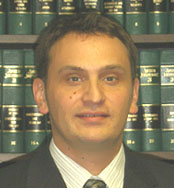

| THE SAINT PAUL PERSONAL INJURY ATTORNEY |
 |
 |
|
UNEMPLOYMENT - eligibility for unemployment related to severance paySTATE OF MINNESOTAIN COURT OF APPEALS A06-660 Martin Garcia, Relator, vs. Alstom Signaling Inc., Respondent, Department of Employment and Economic Development, Respondent. Filed April 3, 2007 Reversed Kalitowski, Judge Department of Employment and Economic Development File Nos. 17703 05, 17704 05 Richard A. Williams, Jr., Williams & Iversen, P.A., 1611 West County Road B, Suite 208, Woodbury, MN 55113 (for relator) Alstom Signaling Inc., 1025 John Street, Henrietta, NY 14586 (respondent) Lee B. Nelson, Linda A. Holmes, Department of Employment and Economic Development, First National Bank Building, 332 Minnesota Street, St. Paul, MN 55101-1351 (for respondent Department of Employment and Economic Development) Considered and decided by Stoneburner, Presiding Judge; Kalitowski, Judge; and Collins, Judge.* S Y L L A B U S An individual who does not file for, receive, or have any entitlement to severance pay while collecting unemployment benefits is eligible to receive unemployment benefits under Minn. Stat. § 268.085, subd. 3 (Supp. 2005). O P I N I O N KALITOWSKI, Judge Relator Martin Garcia challenges the decision by the unemployment law judge of the Department of Employment and Economic Development that he is ineligible to receive unemployment benefits from the date he was placed on furlough status because his employer subsequently terminated him and, upon termination, he was entitled to severance pay. Relator contends the unemployment law judge erred in concluding that the severance payments constituted payments that delay unemployment benefits under Minn. Stat. § 268.085, subd. 3 (Supp. 2005), and that relator is obligated to repay the unemployment benefits he received. FACTS Relator Martin Garcia worked as an engineer for Alstom Signaling Inc. (Alstom) beginning on March 3, 1971. Alstom placed relator on furlough status on May 26, 2005. The record indicates that Alstom often uses furlough as a staffing tool. Furloughed employees do not receive a salary during the furlough period, but they remain active on Alstom’s payroll and continue to receive full medical and dental benefits. After being placed on furlough, relator established a benefit account with the Department of Employment and Economic Development (DEED), effective June 5, 2005. Relator received unemployment benefits in the amount of 3 per week for the weeks ending June 18, 2005, through November 11, 2005. During this period, relator received no W-2 earnings from his employer and collected unemployment benefits totaling ,353. On November 9, 2005, Alstom revoked relator’s furlough status and terminated his employment. Relator appropriately informed DEED that his employment had been terminated and that pursuant to his employment agreement with Alstom he was entitled to receive severance pay. Relator’s severance pay totaled ,859.12 (the equivalent of 61 weeks of wages) to be paid prospectively after November 9, 2005, on a bi-weekly basis. It is undisputed that relator did not receive any unemployment compensation for the same period that he received severance pay from the employer. On December 5, 2005, DEED determined that relator was ineligible for unemployment benefits for the weeks ending June 5, 2005, through November 11, 2005, and that relator had been overpaid ,353 in unemployment benefits during this period. DEED based its determination on the fact that relator received severance pay in an amount greater than his weekly unemployment benefit beginning after November 9, 2005. Relying on Minn. Stat. § 268.085, subd. 3 (Supp. 2005), DEED determined that although relator did not receive severance pay during the furlough period while he was receiving unemployment benefits, the severance pay that he began receiving after November 9, 2005, should relate back to his last day of non-furloughed employment, May 25, 2005, and offset the unemployment benefits received during the furlough period. Relator appealed DEED’s ineligibility and overpayment determinations and the appeal was heard by an unemployment law judge who upheld DEED’s ineligibility and overpayment determinations. On reconsideration, the determinations of the unemployment law judge were affirmed. We granted relator’s petition for writ of certiorari. ISSUE Does Minn. Stat. § 268.085, subd. 3, deny unemployment benefits to an individual who never received, filed to receive, or was entitled to severance pay at the time he was collecting unemployment benefits? ANALYSIS The determination that a person is ineligible to receive unemployment compensation is a question of law, which we review de novo. Roloff v. Comm’r of Dep’t of Employment & Econ. Dev., 668 N.W.2d 12, 14 (Minn. App. 2003), review denied (Minn. Nov. 18, 2003). “The unemployment compensation statute is remedial in nature and must be liberally construed to effectuate the public policy set out in Minn. Stat. § 268.03 . . . . We have stated that this policy urges us to narrowly construe the disqualification provisions.” Jenkins v. Am. Express Fin. Corp., 721 N.W.2d 286, 289 (Minn. 2006) (emphasis added) (quotation omitted). The issue in this case involves the proper construction of Minn. Stat. § 268.085, subd. 3, titled “Payments that delay unemployment benefits.” Subdivision 3 states: (a) An applicant shall not be eligible to receive unemployment benefits for any week with respect to which the applicant is receiving, has received, or has filed for payment, equal to or in excess of the applicant’s weekly unemployment benefit amount, in the form of: . . . (2) severance pay . . . paid by an employer because of, upon, or after separation from employment, but only if the money payment is considered wages at the time of payment[.] . . . (b) This subdivision shall apply to all the weeks of payment and shall be applied to the period immediately following the last day of employment. Minn. Stat. § 268.085, subds. 3(a)(2), 3(b). Under subdivision 3(a)(2), an applicant is not eligible for unemployment benefits for any week in which (1) the applicant received or filed for severance pay, if (2) it was paid by the employer “because of, upon, or after separation from employment” and (3) the payment is “considered wages at the time of payment.” Minn. Stat. § 268.085, subd. 3(a)(2). Here, it is undisputed that relator’s severance pay was paid upon his separation from employment and was considered wages at the time of payment. But relator argues that subdivision 3 does not apply to him because he never received or filed for severance pay while collecting unemployment benefits. Moreover relator never simultaneously collected both unemployment benefits and severance pay, and during the furlough period, when relator collected unemployment benefits, he was not entitled to, nor did he receive, severance pay. Respondent does not dispute relator’s contention, but argues that relator’s situation is nevertheless controlled by subdivision 3(b) which states that “[t]his subdivision shall apply to all the weeks of payment and shall be applied to the period immediately following the last day of employment.” Minn. Stat. § 268.085, subd. 3(b). Applying this language, respondent takes the position that it is required to retroactively apply relator’s entitlement to severance pay to relator’s last day of employment, May 25, 2005, thereby making him retroactively ineligible for unemployment benefits. Respondent further supports its interpretation by arguing that: If the statute did not explicitly provide for application of severance to the weeks following separation, employers and employees would easily circumvent the requirements avoiding double payment of severance and unemployment by delaying payment of severance until after some months of unemployment benefits were collected. Employers could simply write up severance agreements stating that employees would not receive severance until three months after their separation, allowing employees to collect three months of unemployment benefits before their severance started and avoiding the application of the statute. But the record here does not contain any evidence of improper manipulation by relator or his employer. The undisputed facts in this record indicate that (1) relator’s employer has adopted the furlough status as a method by which it can retain access to employees who have key skill sets; (2) during the furlough period relator received full medical and dental benefits and was deemed active on his employer’s payroll; (3) relator was placed on furlough status on May 26, 2005; (4) relator’s employer determined that there was not likely to be business available and permanently terminated relator on November 9, 2005; (5) under the employer’s separation plan, relator was not entitled to severance pay while on furlough, but became eligible when he was permanently terminated; and (6) pursuant to the separation plan, relator did not receive a lump-sum severance but was paid on a bi-weekly basis beginning after November 9, 2005. The Minnesota Supreme Court has recently noted that: [t]he unemployment compensation statute is remedial in nature and must be liberally construed to effectuate the public policy set out in Minn. Stat. § 268.03, which states that the unemployment benefits provisions are to be used for the benefit of persons unemployed through no fault of their own. We have stated that this policy urges us to narrowly construe the disqualification provisions. Jenkins, 721 N.W.2d at 289 (emphasis added) (quotation omitted). Because the policy reasoning supporting the narrow construction of disqualification provisions also applies to ineligibility provisions, we construe subdivision 3 narrowly. We reject respondent’s interpretation of the statute as applied to the facts here. Respondent’s interpretation ignores the application of the term “payment” as used in both subdivision 3(a) and 3(b). As applied to these facts, the term “payment” in subdivision 3(a) specifically refers to severance that has been received or filed for which is equal to or greater than unemployment benefits received for the same period of time. It follows that the term “payment” in subdivision 3(b) also refers to severance that is received or filed for simultaneous to the collection of unemployment benefits. Thus, when subdivision 3(b) states “[t]his subdivision shall apply to all the weeks of payment . . .” it is properly interpreted to mean all the weeks of payment in which a person receives or files for severance pay while simultaneously collecting unemployment benefits. Here, relator’s last day of work for Alstom was May 25, 2005, prior to the furlough period. Relator received unemployment benefits for the period from the weeks ending June 18, 2005, through November 11, 2005. As a result of his permanent termination, relator became entitled to receive severance payments after November 9, 2005. Because these severance payments were not received or applied for while relator was receiving unemployment benefits, Minn. Stat. § 268.085, subd. 3, does not apply to make relator retroactively ineligible for unemployment benefits. Relator neither received nor filed for severance pay during this period. Nor under the undisputed terms of his employment agreement was he entitled to receive severance pay while he was on furlough. D E C I S I O N The unemployment law judge erred by determining that relator was ineligible to receive unemployment benefits and requiring relator to repay the unemployment benefits he had received. Minn. Stat. § 268.085, subd. 3, does not apply to an individual who did not file for or receive severance pay and who was not entitled to receive severance pay while simultaneously collecting unemployment benefits. Reversed. |
|||||||||||||||||||||||||||||||||||||||||||||||||||||||||||||||||||||||
| By visiting this page or clicking the "submit" button above, you agree that you have read and accept this "disclaimer". |
||||||||||||||||||||||||||||||||||||||||||||||||||||||||||||||||||||||||
| Copyright ©
Michael E. Douglas, Attorney at Law, Saint Paul MN. All Rights
Reserved. Minnesota Lawyer representing Personal Injury, Car / Auto Accident, Workers Compensation, Medical Malpractice, Social Security Disability claims. Dedicated to Injured Workers, Victims of Negligence, Car Accidents, Victims of Fraud, and those in need of legal assistance. |